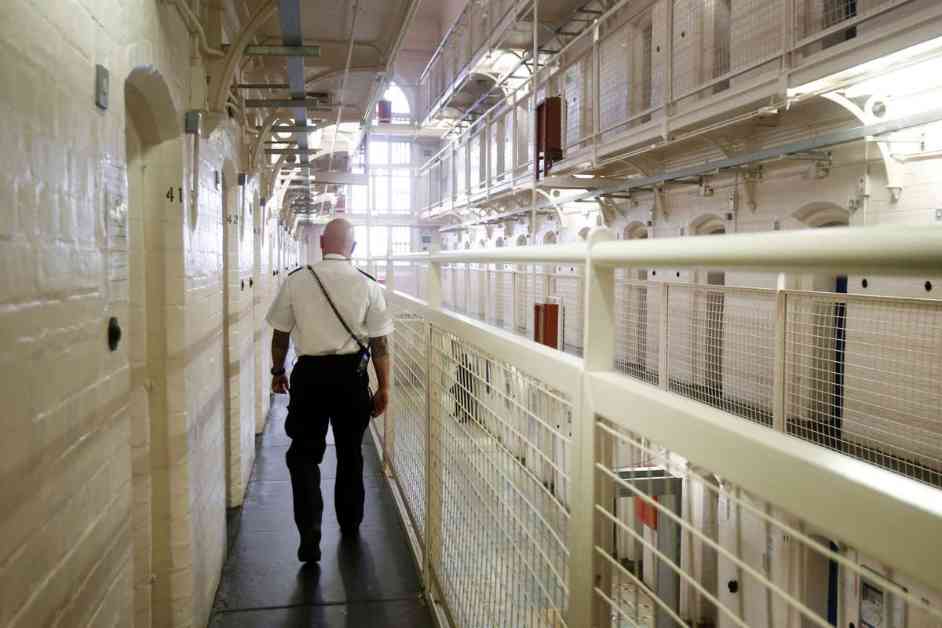Britain’s prisons are facing a crisis as far-right riots have pushed the system to breaking point, triggering emergency measures to address severe overcrowding. The government’s response to the widespread disorder has raised concerns among experts, with fears that the capacity gained through early prisoner releases has rapidly disappeared. At least 677 suspected rioters have been charged, exacerbating the strain on an already overloaded prison system.
The situation in Merseyside, where clashes first erupted following the tragic killing of three schoolgirls, highlights the severity of the crisis. Reports suggest that there were only two prison spaces left in the region over the weekend as rioters were swiftly brought before the courts in fast-tracked hearings. Stuart Nolan, chair of the criminal law committee at the Law Society, described the riots as the “straw that broke the camel’s back,” emphasizing the chronic nature of the prison system’s challenges.
The widespread disorder has resulted in at least 460 individuals appearing in magistrates’ courts across the country, further adding to the pressure on the prison system. Mark Fairhurst, chair of the Prison Officers’ Association, revealed that there were only 340 spaces remaining in the male estate nationwide after 397 new receptions. The escalating situation has forced the government to implement emergency measures to address the crisis.
Emergency Measures to Address Overcrowding
Operation Early Dawn, launched in response to the riots, has been described as a “one in, one out” policy aimed at managing the influx of defendants into the criminal justice system. Under this policy, defendants may be held in police cells until space becomes available in prisons. The fear of suspects being released on police bail due to lack of prison capacity looms large, although government officials have assured that public safety will not be compromised.
Prime Minister Sir Keir Starmer acknowledged the difficult decisions being made to alleviate the strain on the prison system, attributing the crisis to the inadequacies inherited from the previous administration. The government’s plans to release some prisoners after serving only 40 percent of their sentence are set to take effect in September, providing a temporary respite amidst the current turmoil.
Long-Term Solutions and Challenges
Despite the short-term measures being implemented, concerns remain about the long-term sustainability of the prison system. The SDS40 scheme, which will see the release of 5,500 offenders in September and October, poses challenges in terms of managing the influx of inmates. The Prison Reform Trust (PRT) warned that the prison system’s lack of resilience has been exposed by the recent events, signaling the need for more comprehensive solutions.
Alex Hewson of the PRT expressed concerns about the government’s ability to navigate the crisis, highlighting the complexity of the challenges ahead. The emergency measures under Operation Early Dawn may offer temporary relief, but they do not address the underlying issues plaguing the criminal justice system. Andrew Neilson of the Howard League for Penal Reform echoed these sentiments, emphasizing the need for sustained efforts to address overcrowding and operational challenges.
Implications for the Criminal Justice System
The emergency measures implemented to ease overcrowding have raised concerns among stakeholders in the criminal justice system. The Magistrates’ Association expressed apprehension about delayed hearings exacerbating court backlogs, underscoring the need for additional resources to support the administration of justice. Chief executive Tom Franklin emphasized the real-life consequences of case delays on victims, witnesses, and defendants, urging for a more robust approach to addressing systemic challenges.
Deputy Chief Constable Nev Kemp of the National Police Chiefs’ Council reassured the public of law enforcement’s commitment to ensuring public safety amid the crisis. The ongoing arrests and enforcement efforts are critical in maintaining order and upholding the rule of law in the face of heightened tensions. The government’s response to the crisis reflects the complex interplay of factors contributing to the overcrowding and operational challenges within the prison system.
In conclusion, the crisis in overcrowded prisons triggered by far-right riots underscores the need for comprehensive reforms to address systemic challenges. The emergency measures implemented by the government provide a temporary reprieve, but long-term solutions are essential to ensure the sustainability of the criminal justice system. Stakeholders must work together to navigate the complexities of the crisis and devise effective strategies to mitigate overcrowding and operational pressures.












